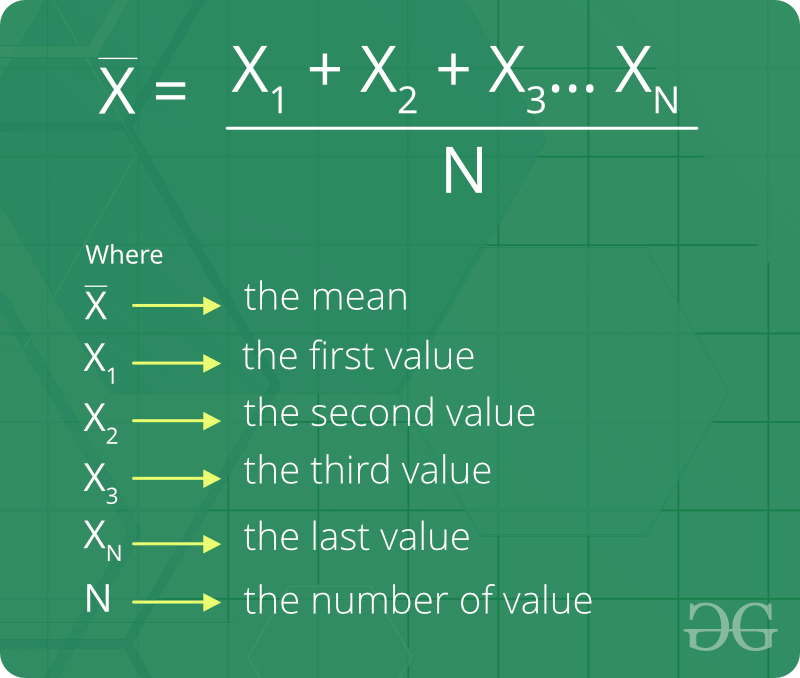Arithmetic Mean
Last Updated :
02 Jul, 2022
Arithmetic mean, also called the average or average value, is the quantity obtained by summing two or more numbers or variables and then dividing by the number of numbers or variables. The arithmetic mean is important in statistics.
For example, Let’s say there are only two quantities involved, the arithmetic mean is obtained simply by adding the quantities and dividing by 2.
Some interesting fact about Arithmetic Mean :
- The mean of n numbers x1, x2, . . ., xn is x. If each observation is increased by p, the mean of the new observations is (x + p).
- The mean of n numbers x1, x2, . . ., xn is x. If each observation is decreased by p, the mean of the new observations is (x – p).
- The mean of n numbers x1, x2, . . ., xn is x. If each observation is multiplied by a nonzero number p, the mean of the new observations is px.
- The mean of n numbers x1, x2, . . ., xn is x. If each observation is divided by a nonzero number p, the mean of the new observations is (x/p).
Formula of Arithmetic Mean:

How to find Arithmetic Mean ?
Given three integers A, B and N the task is to find N Arithmetic means between A and B. We basically need to insert N terms in an Arithmetic progression. where A and B are first and last terms.
Examples:
Input : A = 20 B = 32 N = 5
Output : 22 24 26 28 30
The Arithmetic progression series is
20 22 24 26 28 30 32
Input : A = 5 B = 35 N = 5
Output : 10 15 20 25 30
Approach :
Let A1, A2, A3, A4……An be N Arithmetic Means between two given numbers A and B . Then A, A1, A2 ….. An, B will be in Arithmetic Progression. Now B = (N+2)th term of the Arithmetic progression. So :
Finding the (N+2)th term of the Arithmetic progression Series, where d is the Common Difference
B = A + (N + 2 - 1)d
B - A = (N + 1)d
So the Common Difference d is given by.
d = (B - A) / (N + 1)
We have the value of A and the value of the common difference(d), now we can find all the N Arithmetic Means between A and B.
C++
#include <bits/stdc++.h>
using namespace std;
void printAMeans(int A, int B, int N)
{
float d = (float)(B - A) / (N + 1);
for (int i = 1; i <= N; i++)
cout << (A + i * d) << " ";
}
int main()
{
int A = 20, B = 32, N = 5;
printAMeans(A, B, N);
return 0;
}
|
Java
import java.io.*;
import java.lang.*;
import java.util.*;
public class GFG {
static void printAMeans(int A, int B, int N)
{
float d = (float)(B - A) / (N + 1);
for (int i = 1; i <= N; i++)
System.out.print((A + i * d) + " ");
}
public static void main(String args[])
{
int A = 20, B = 32, N = 5;
printAMeans(A, B, N);
}
}
|
Python3
def printAMeans(A, B, N):
d = (B - A) / (N + 1)
for i in range(1, N + 1):
print(int(A + i * d), end = " ")
A = 20; B = 32; N = 5
printAMeans(A, B, N)
|
C#
using System;
public class GFG {
static void printAMeans(int A, int B, int N)
{
float d = (float)(B - A) / (N + 1);
for (int i = 1; i <= N; i++)
Console.Write((A + i * d) + " ");
}
public static void Main()
{
int A = 20, B = 32, N = 5;
printAMeans(A, B, N);
}
}
|
PHP
<?php
function printAMeans($A, $B, $N)
{
$d = ($B - $A) / ($N + 1);
for ($i = 1; $i <= $N; $i++)
echo ($A + $i * $d), " ";
}
$A = 20; $B = 32;
$N = 5;
printAMeans($A, $B, $N);
?>
|
Javascript
<script>
function printAMeans(A, B, N)
{
let d = (B - A) / (N + 1);
for(let i = 1; i <= N; i++)
document.write((A + i * d) + " ");
}
let A = 20, B = 32, N = 5;
printAMeans(A, B, N);
</script>
|
Time Complexity: O(N)
Auxiliary Space: O(1)
Basic Program related to Arithmetic Mean
Like Article
Suggest improvement
Share your thoughts in the comments
Please Login to comment...